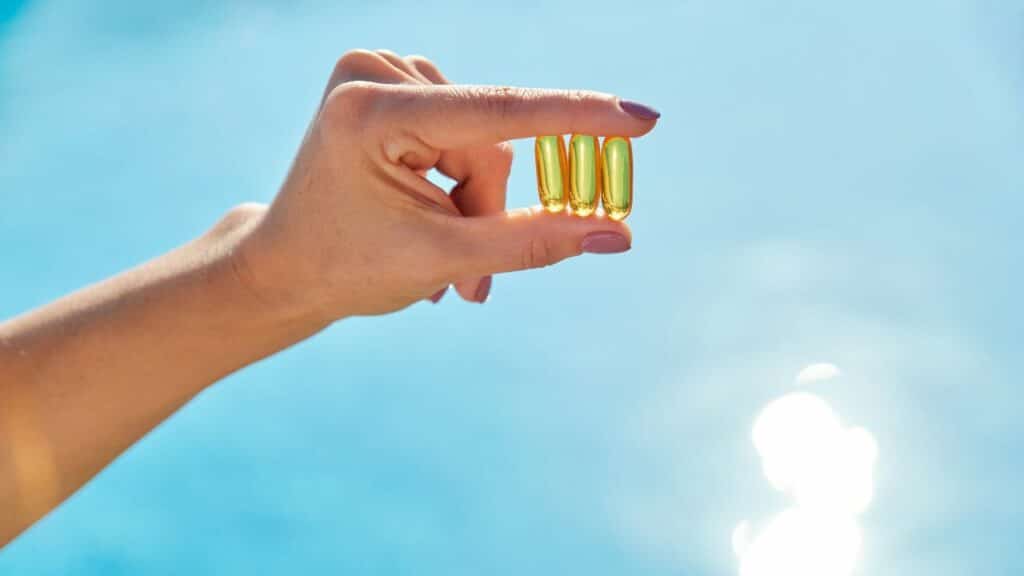Most people get 90% of their Vitamin D requirements through exposure to sunlight, but winter and recent lock-down measures mean people are getting less sun – and less vitamin D – than before.
Vitamin D is essential for supporting strong bones and maintaining your immune system and it can be found in some food and drink or gathered through sunlight.
However, many people still struggle to get the Vitamin D they need, due to poor diet or too much time spent indoors. And a common question we get asked frequently is “How long to recover from vitamin d deficiency?”
Recovery time from a vitamin D deficiency can vary based on the severity of the deficiency and individual health factors. Generally, significant increases in vitamin D blood levels can be seen after taking supplements for 8-12 weeks.
However, those with very low levels might start feeling better within a few days of beginning treatment. In more severe cases, full recovery can take around 4-6 months. (source)
Fortunately, there are plenty of other ways to get the vitamins you need for a healthy lifestyle, from changing your diet to taking vitamin D supplements.
Table of Contents
What Does Vitamin D Do?

In boring chemical terms, vitamin D helps regulate the amount of phosphate and calcium in the body, both of which are central to bone strength and the immune system.
Interestingly, a growing body of research shows that vitamin D deficiency can be linked to heart disease, cancer, depression, arthritis, and more.
While it’s easy to get enough calcium and phosphate in your diet (especially if you eat plenty of meat and dairy), you need to keep them within safe levels with vitamin D.
If you aren’t able to restore vitamin D levels from sunlight or your diet, then you may be at greater risk of a vitamin D deficiency.
How Long To Recover from Vitamin D Deficiency?
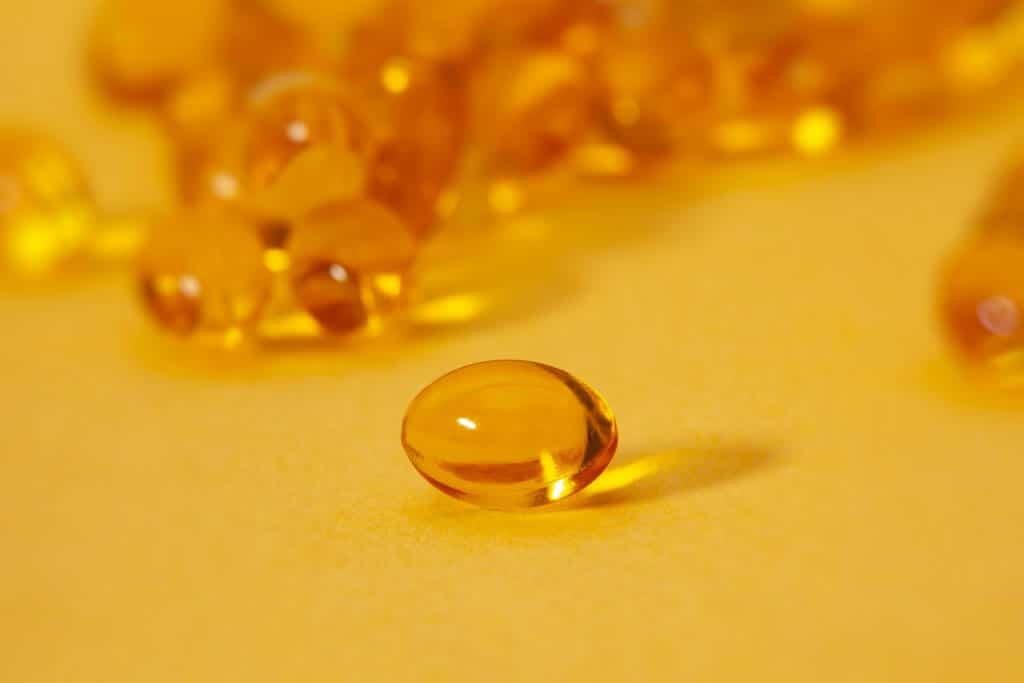
Unfortunately, there’s no definite answer on how quickly vitamin D takes effect on the body, as various factors like dosage and existing vitamin D levels affect the speed of absorption.
If you’re battling a serious vitamin D deficiency, then it could take up to a month of daily supplements before you start to feel normal again.
If you use higher doses and are looking for a noticeable improvement in health, we recommend taking a consistent dose of vitamin D supplements and monitoring your well-being for a month.
This may seem like a long time, but it will take a while for your body to properly absorb the vitamin D before it can put it to use, so be patient!
Low Vitamin D Symptoms
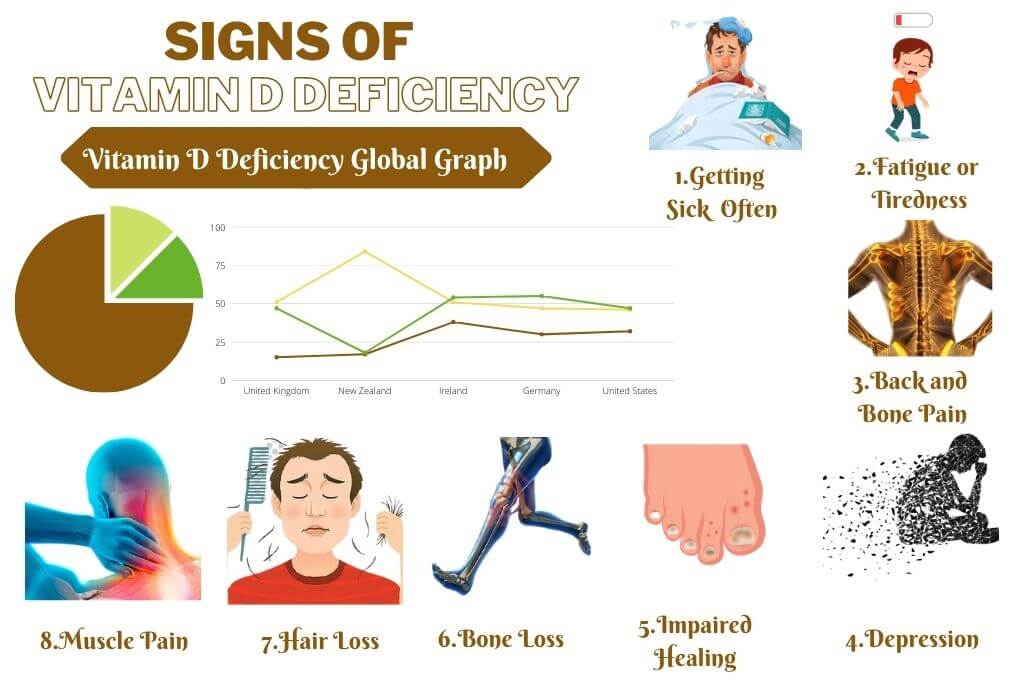
Vitamin D is an extremely important vitamin with powerful benefits, but it can be hard to get enough in your daily routine, especially when wrapped up warm over winter.
For these reasons, vitamin D deficiency is one of the most common forms of malnutrition across the world but – thankfully – they can be cured with vitamin D supplements.
Aside from a general meh feeling, symptoms of low vitamin D levels can include fatigue, muscle pain and regular periods of sickness. If you’re struggling to get out of bed or coming down with the sniffles more than usual, it could be nothing, but keep an eye out for the following 8 symptoms of vitamin D deficiency:
Getting Sick Often
One of vitamin D’s most well-known benefits is helping to keep your immune system strong, so if you keep catching a cold it may be due to a deficiency.
Make sure to wrap up warm, stay safe, and take your vitamin D supplements and you should be fit as a fiddle in no time!
Fatigue or Tiredness
Tiredness is a common complaint with many causes such as vitamin D deficiency, though it is often blamed on more obvious factors like poor sleep quality.
A variety of studies have found links between fatigue and low vitamin D levels, so make sure to get enough (vitamin) D and Zs if you struggle with tiredness.
Back and Bone Pain
Vitamin D is essential for healthy bones, as it improves your body’s absorption of calcium, and if you aren’t getting the vitamin D you need, your body will be running low on calcium too.
Fortunately, there are plenty of yoghurts with added vitamin D supplements which allow you to enjoy a healthy snack and boost your vitamin levels at the same time!
Depression
While vitamins aren’t enough to cure mental illness, numerous studies have found a link between vitamin D deficiency and depression.
When you consider that vitamin D deficiency and seasonal depression are more common in the winter months due to reduced sunlight, it seems kinda obvious.
Impaired Healing
Studies suggest that vitamin D’s role in controlling inflammation and fighting infection boosts healing, meaning that really slow healing may indicate a shortage of the vitamin.
Although vitamin D supplements aren’t going to make you invulnerable, getting a balanced diet and plenty of vitamins will help you recover from injuries quickly.
Bone Loss
Because vitamin D is so essential for building and maintaining healthy bones, bone loss or low bone density may indicate a vitamin D deficiency. By making sure you get enough vitamin D and calcium, you can ward off bone loss and bulk up your bones!
Hair Loss
Although hair loss is an unfortunate fact of life for most people, severe hair loss is a cause for concern and may be due to severe stress or nutrient deficiency. Assuming you’re not (figuratively or literally) tearing your hair out, vitamin D supplements like topical creams may help prevent hair loss.
Muscle Pain
Although muscle pain can be caused by all sorts of things – from over-exertion to dehydration – vitamin D deficiency is linked to increased sensitivity in pain receptors known as nociceptors.
By making sure that you’re hydrated, rested, and dosed up with vitamin D, you should be able to reduce muscle pain in everyday life.
If you’ve noticed any of the following symptoms, you may be suffering from low levels of vitamin D, but we advise consulting a medical professional to be sure.
If you’re otherwise healthy, you can still enjoy the benefits of vitamin D by incorporating these sources of the vitamin into your routine.
Best Sources of Vitamin D for Faster Recovery
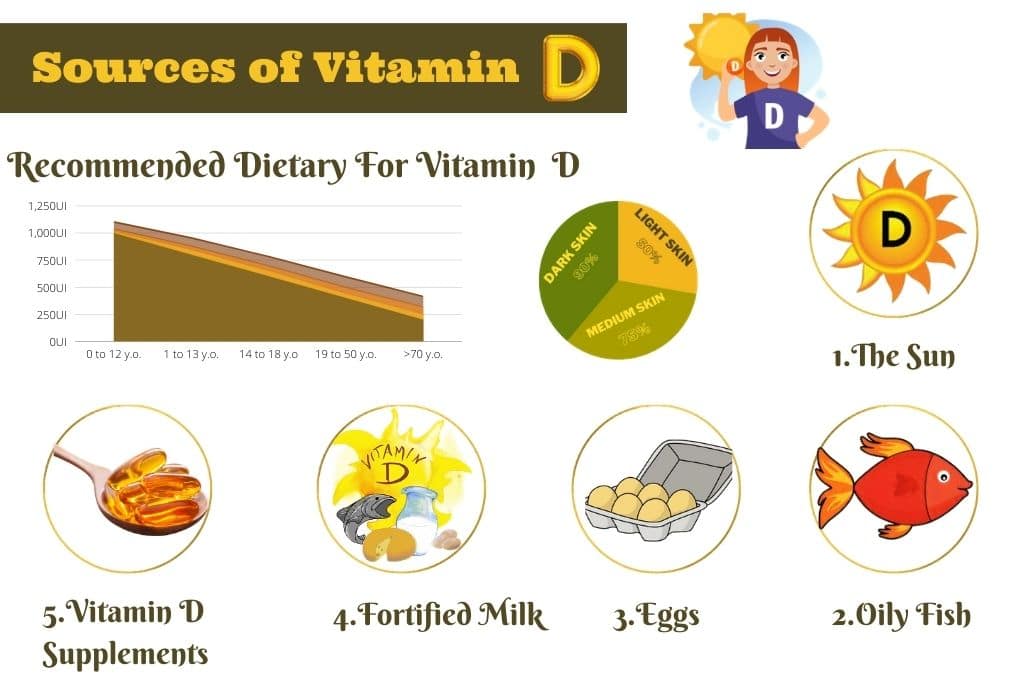
The Sun
Our fiery friend in the sky is still the number one way to get the recommended amount of vitamin D, especially in warmer climates and during the summer.
Our bodies will naturally produce vitamin D when exposed to UV rays from the sun, but make sure you sun responsibly and top up your levels with vitamin D supplements when the sun is weaker in winter.
Here’s an interesting video that breaks down the process of how our skin turns sunlight into vitamin D.
Oily Fish
As well as being high in protein and omega-3 (which is good for cardiovascular health), oily fish such as salmon, mackerel, and tuna contain vitamin D.
If you’re concerned about a potential vitamin D deficiency, mix up your menu plan with some of the suggestions below and enjoy dinners as tasty as they are healthy:
- Salmon: Try with sweet chili sauce and stir-fried veggies for an Asian-inspired supper
- Mackerel: Mix tinned mackerel with mashed potato for cheap and cheerful fishcakes.
- Sardines: Fry and stir through passata to make an Italian-inspired pasta sauce.
- Tuna: The classic store-cupboard staple is incredibly versatile in pasta, sandwiches, and more.
- Swordfish: If you’re feeling fancy, char-grill swordfish steaks and serve with mango salsa.
Eggs
Incredibly economical, versatile, and full of naturally occurring vitamin D, eggs are the underrated wonder food that you should be eating more of. Whether you like them scrambled, poached, or boiled, ask yourself – how do you like your vitamin D in the morning?
Fortified Milk
A growing number of milk companies are ‘fortifying’ their products with beneficial additives like vitamin D supplements due to the obvious benefits of vitamin D and calcium.
Products fortified in this way usually advertise the fact as a positive, so make sure to check the labels when you next go grocery shopping for a little extra vitamins on your cereal.
Vitamin D Supplements
If you can’t be bothered with salmon fillets and long walks in the sun (there’s no shame in a few casseroles and cozy days over winter), then a simple supplement or two is the way to go.
There are tons of supplements on the market that will help you meet your daily vitamin D requirements, so if you struggle to get the natural sources of vitamin D, you can still get your essential nutrients from a bottle.
However, supplements aren’t right for everyone, and if you’ve managed to avoid a vitamin D deficiency so far, then you might just be pouring your money down the toilet. Before raiding your local pharmacy, consider the following:
Should You Take Vitamin D Supplements to Recover from Deficiency?
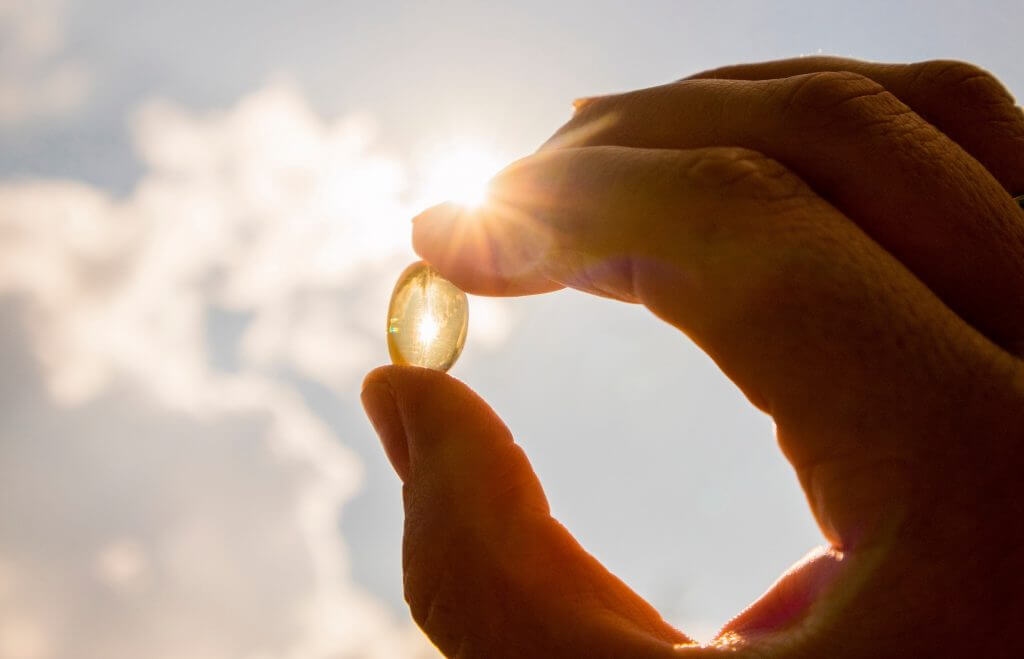
As the main source of vitamin D is sunlight, many people are deficient in the vitamin – as many as 40% of Americans according to national surveys – and could benefit from supplements.
Vitamin D deficiency is one of the most common vitamin deficiencies in the world but most people lacking this vitamin will only suffer mild symptoms.
We know it’s boring, but you should probably get some medical advice before you start loading up on vitamin D, as you can get too much of a good thing.
Although vitamin D overdoses are extremely rare – you’d have to take something like 40 times the recommended dosage – you should get professional guidance before adding high-strength supplements to your daily routine.
Because of the many benefits that vitamin D offers and the low risk of overdosing, we believe that vitamin D supplements would be beneficial for most adults as part of a healthy lifestyle.
Additionally, we recommend that you try to get more time in the sun and fish suppers for general health, though it might take some time before you see any effects.
Frequently Asked Questions About Low Vitamin D
1. How long does it take to bring vitamin D levels up?
It generally takes a few weeks to several months of daily vitamin D supplementation for levels in the body to rise, depending on the dose and individual factors (source)
2. How long does it take to restore vitamin D levels from the sun?
Sun exposure can help raise vitamin D levels, but the exact time varies based on factors like skin type, location, and sun intensity. In general, sunlight will raise levels of active Vitamin D within about 8 hours – depending on the strength of the sun and your level of absorption.
3. What happens if your vitamin D is low?
Low vitamin D can lead to fatigue, muscle weakness, bone pain, and mood changes. Severe deficiencies can cause serious health issues like osteoporosis.
4. How soon will I feel better after taking vitamin D3?
If you have very low vitamin D levels, you might start feeling better within a few days of starting vitamin D3 supplements (source).
5. Does vitamin D affect hair?
Yes, low vitamin D levels may be linked to hair loss, as it’s important for healthy hair follicle growth. However, more research is needed to confirm this.
Conclusion
Whether you’re feeling down or want to boost your general health with some extra vitamins, supplements are an easy way to get more essential nutrients into your busy schedule.
Hopefully, this little guide has helped shine a light on ‘the sunshine vitamin’ and inspired you to eat more oily fish before your hike in the sunshine.
What’s that? You’d rather relax on the couch with your favorite snack than work sardines into your diet? Fair enough, it takes all kinds to make the world go round, but we hope you’re getting enough vitamin D, however, you choose to take it.
